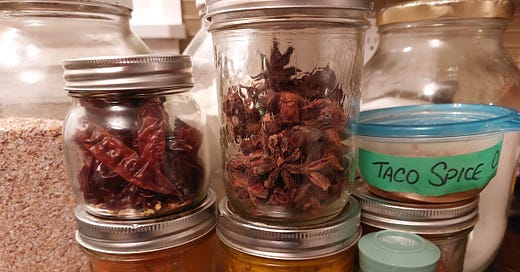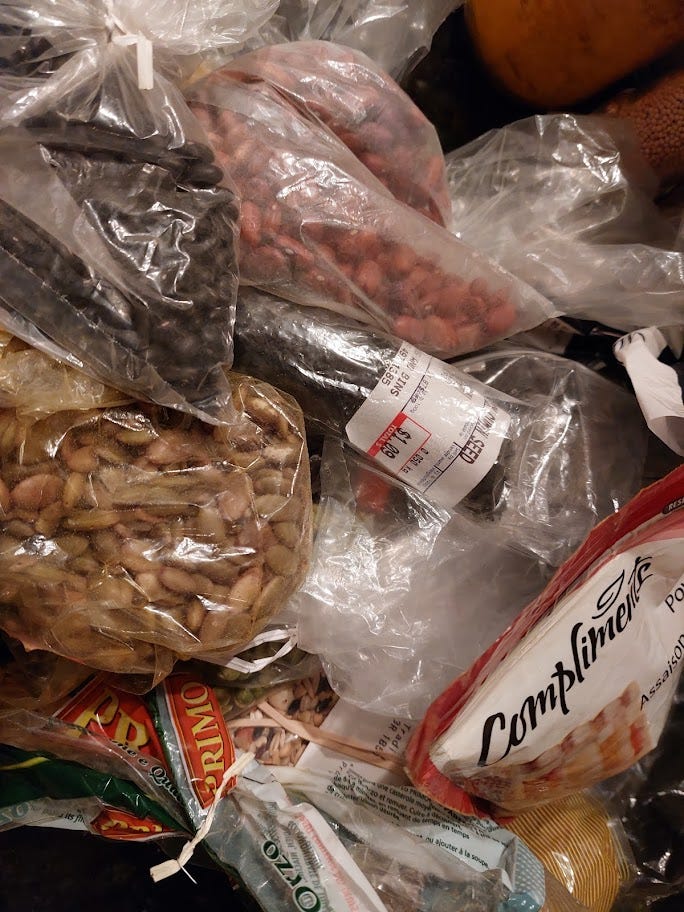One of the things I love about the Internet is that you can find like-minded souls on almost any topic. Whether you’re looking for people who want to discuss the ethical dilemmas presented in 1960s comic books or discontinued flavours of Kool-Aid, your people are out there and if you look hard enough you’ll find them.
And one of the easiest things to coalesce a group is a shared disdain for something. One of the things from which I get some particular joy is mocking the excesses of the aesthetic known as Modern Farmhouse. You know what I’m talking about here: barn board, shiplap, wrought iron, neutral/beige everything, and breadboxes printed “Bread” in the painfully-overexposed Rae Dunn typeface.
So when I stumbled across the Facebook group “People Against Modern Farmhouse” I finally had an outlet for my scorn and I get a daily dose of the giggles from photos of uncleanable white surfaces and cheesy pseudo-inspirational signs made of old wood pallets.
(And now that I’ve offended three quarters of the people who have renovated their homes in the last ten years, let me just say that it’s the excesses and ubiquity I find hilarious, and if you do, in fact, live on a farm – well, more power to you.)
One of the hallmarks of Modern Farmhouse is turning functional things into matchy-matchy decorative elements (see snarky breadbox comment above) and kitchen-kitsch that suggests hospitality and home-cooked meals. I mean, can you really put a box of store-bought cookies on your “rustic” open-concept shelving? Not very “wholesome” is it? Better get those into a white ceramic cookie jar (labelled “Cookies”, of course) stat!
But it raises an important question: aesthetics aside, how should you store pantry items? What should you consider before dumping everything into matching Ball jars?
Some things to consider:
Your environment. It may seem obvious, but things like weather and location matter. Does your kitchen experience significant fluctuations in temperature and humidity? If you have something that needs to keep several months stored in cardboard boxes and paper bags, you might consider decanting it into re-usuable bins or jars lest your flour get damp or your sugar rock hard. And let’s be honest, pantry pests aren’t always a result of your housekeeping - anyone who’s every lived in an old house knows that a certain amount of rodentia is par for the course, and if you’ve ever accidently contracted pantry moths from a bag of sketchy rice you already know the benefits of impermeable containers.
The quantity you use. If you use the whole box or bag of pasta in one go there’s no point decanting it into a fancy jar. If you use a cup or two? Maybe there is. You probably don’t use the whole bag of lentils in a batch of soup, so it makes sense to empty them from their bulk store bag into a clean jar.
Your frequency of use. Most of us use salt on a daily basis, so it makes sense to keep it visible and close at hand. Does your paprika, cardamom, cumin seed, and dry mustard need such a place of prominence? If you use whole cloves twice a year does it make sense to have a bottle that matches that of the oregano you use for your weekly spaghetti night?
The lifespan of products. Expiry and best before dates are predicated on bottles and packages being unopened. The minute you open your bottle of olive oil it starts to oxidize, and decanting it into a pretty clear glass bottle only hastens its demise. Fancy loose-leaf teas get stale when exposed to light and dried herbs similarly deteriorate, so consider that different products have different storage needs before committing to a style.
Your kitchen palate. I didn’t earn the nickname “Spice Pervert” for nothing. I have more spices, shapes of pasta, and types of rice than many well-stocked shops. But that’s me. Be honest with yourself. It doesn’t make you any less of a good cook to have four or five favourites and stick to them. In fact, it means your skill and fluency with your favourite things is greater. Do you really need a spice rack with slots for 24 matching silver-capped bottles? Make space for the things you use all the time.
An organization system is important because it imposes as certain rigor - it helps ensure that we don’t run out of things unexpectedly, that we rotate product to ensure freshness, and that we keep our food safe from the elements until we are ready to use it. It ensures that we don’t end up running to the store for more rice when have rice in the house, only it’s buried in a nightmare like this:
And here’s a thought I hope you’ll ponder before you stock up on bins, bottles, and fancy jars: I think it’s important to consider your relationship with food on a deeper level. I don’t believe that Modern Farmhouse and its related wellness, natural living, and minimalist aesthetics are just passing fashions: they speak to a certain longing in our zeitgeist for simplicity, for nature, and for life to be less complicated (dammit!). Is there a subconscious guilt around processed food that we assuage by pouring our granola into Mason jars? Does a shelf full of pretty spices speak to our desires to be chefs and worldly cosmopolitans? Is a shiny breadbox a reminder that your house is one that has “real” bread, not the sliced stuff in a plastic bag? How much is aspiration and how much meets our true needs and inclinations?
So, I’m not going to tell you what to do, because what I do only works for me. In fact, what I do would drive most people mad, would make a professional decorator weep, and would put Marie Kondo and other minimalist gurus into a rage. So before you let anyone convince you that their way is the best and try to sell you something to make it a reality (because of course!), take a long look at the kind of cook you are and not just the kind you wish you were. You don’t need a pantry full of glass to see your kitchen clearly.




